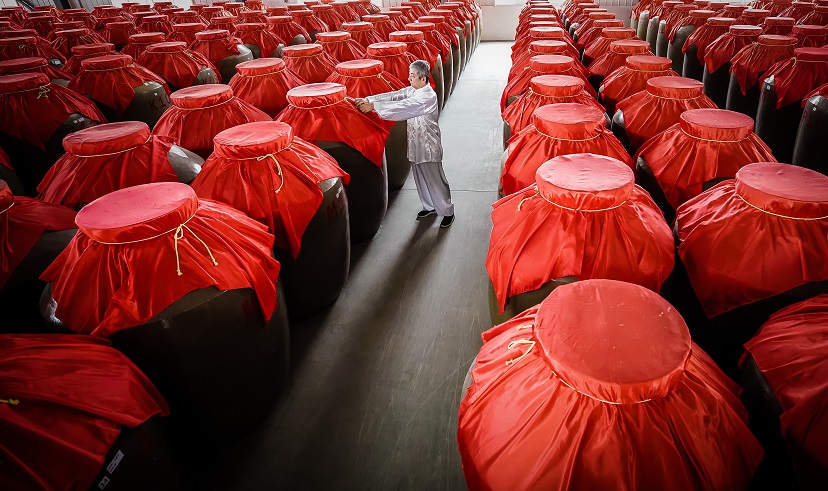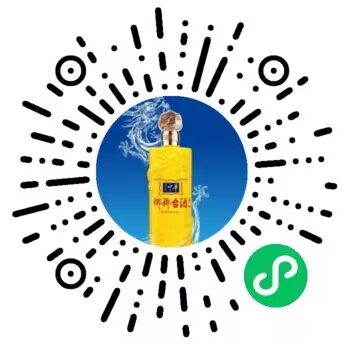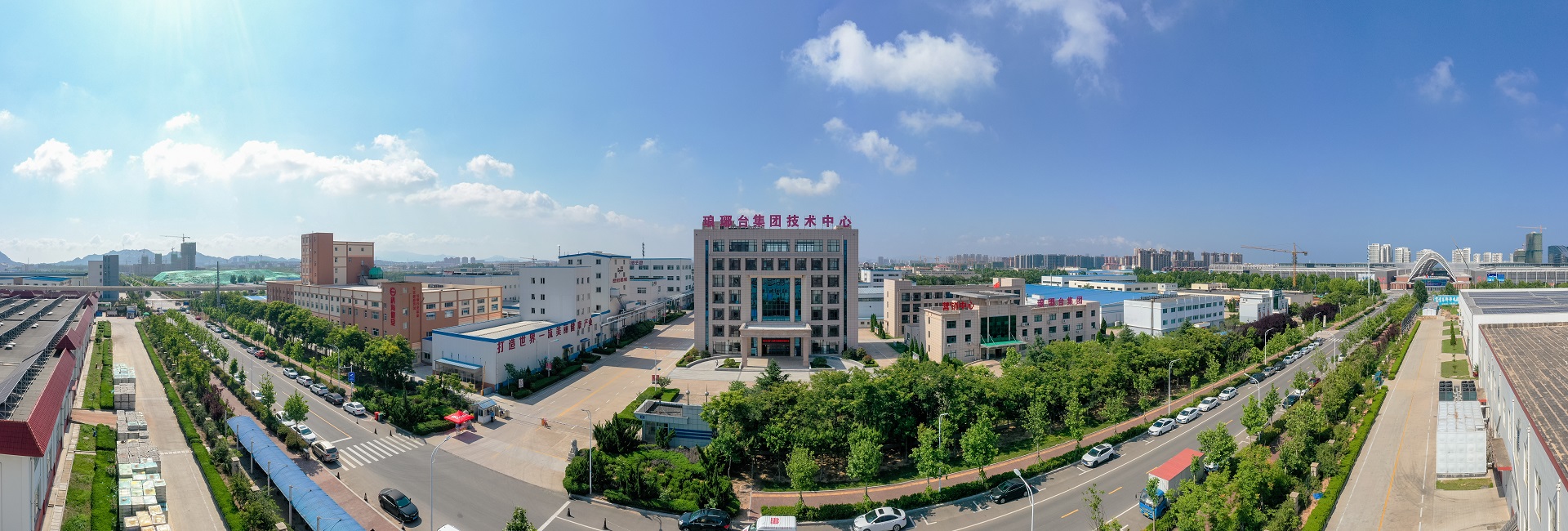
Langyatai is located on the Yellow Coast within the territory of Qingdao. Built by Emperor Qin Shihuang, it is an ancient scenic spot in China. Here, surrounded by the sea on three sides, the weather is spectacular, the scenery is beautiful, and the scenery is pleasant. On the stage, you can see a mirage, which is known as a fairyland on earth. There is a spring under Langya Terrace, where the wine is brewed and the aroma is fragrant. This place was once a fiefdom of the State of Qi, and after Emperor Qin Shi Huang unified China, Langya County was established here.
The agricultural foundation with abundant grain and abundant fruits, as well as the hardworking and intelligent people of Langya, have nurtured and created a brilliant Qilu culture. The prosperity of the economy and the development of agriculture have provided a unique material foundation for the development of liquor culture in the Langya region, making the ancient Langya brewing industry prosperous and Langyatai liquor source flowing far and wide. According to research, Langyatai liquor originated in the Warring States period and has gone through centuries, integrating the great achievements of millennium old brewing techniques. It is the crystallization of ancient Langyatai liquor culture and a historical witness to the economic prosperity of the ancient Langyatai region.
The brewing history of Langyatai liquor can be traced back to two thousand years ago. Its development process generally began in the Spring and Autumn Period and Warring States period, flourished in the Qin and Han dynasties, and reached its peak in the Tang and Song dynasties. Among them, the Qin and Han dynasties were an important stage in the development of Langyatai liquor, which played a connecting role in the development of Langyatai liquor and laid the foundation for it.

It is said that during the Spring and Autumn and Warring States periods, the brewing of Langyatai liquor began with King Goujian of Yue. According to historical records, King Goujian of Yue, after enduring hardships and striving for strength, finally defeated the State of Wu. In order to dominate the Central Plains, the capital of Langya was relocated in 472 BC, and the brewing methods of the Wu Yue region were transmitted to Langya. The people of Langya followed the brewing method taught by King Goujian of Yue and brewed wine from the water of Langya Mountain Spring with exquisite craftsmanship, which was presented to Goujian. After drinking it, Goujian repeatedly praised it for surpassing the wine of Wu and Yue, and named the wine "Langya Red". Afterwards, King Goujian of Yue built a high platform on Mount Langya and climbed the platform to view the vast sea to the east and his hometown to the south. On every festival, the King of Yue would feast his subjects on Langya Terrace and drink "Langya Red" Baijiu. Under the influence of the King of Yue, the folk in ancient Langya also formed the habit of freely drinking "Langya Red" Baijiu in every festival. The trend of binge drinking became a fashion in ancient Langya, which greatly promoted the development of ancient Langya brewing industry.

In 221 BC, Emperor Qin Shi Huang conquered the six states and established a unified multi-ethnic country, establishing Langya County in Langya. The quell of the war and the unification of the country played an important role in promoting the prosperity of Langya's economy and the development of liquor culture. According to the Records of the Grand Historian, after Emperor Qin Shihuang unified the six states, in order to consolidate his rule and demonstrate the authority of the Great Qin, he sought the elixir of immortality and began a nationwide parade. Emperor Qin Shihuang conducted five rounds of inspections throughout the country and three visits to Langya. In 219 BC, Qin Shi Huang led a huge convoy from Xianyang, Linjieshi, Zhifu, and Langya, marking his first ascent to Langya. The clear water and blue sky of Langya, the mountain haze and sea waves intoxicated Emperor Qin Shihuang. "Great joy, stay for three months", and forget to return with joy. Emperor Qin Shihuang ordered the relocation of 30000 households from the mainland, the flattening of the old platform built by King Goujian of Yue, and the construction of a magnificent new platform. He also "erected stone carvings to praise Qin's virtues," and sent Xu Fu and thousands of children and men to the East to search for elixir of life. In 218 and 210 BC, Emperor Qin Shi Huang once again visited Langyatai twice. Qin Shi Huang's three tours of Langya played an important role in promoting the prosperity of the economy and wine culture in the Langya region. A large number of immigrants laid the foundation for the development of agriculture and economic prosperity in Langya region. In ancient times, the scarcity of population and extremely poor productivity were the main reasons for the underdevelopment of regional economies. In 219 BC, Emperor Qin Shi Huang relocated 30000 households to Langya, exempting them from corvee for 12 years. This enabled the people of Langya to recuperate and have abundant labor, and a large area of land abandoned by war was reclaimed and utilized. Agriculture experienced an unprecedented prosperity, with a full national treasury and surplus grain for each household. The development of agriculture provided a solid material foundation for large-scale brewing.
Qin Shi Huang's three trips to Langya promoted the exchange of Eastern and Western cultures. The capital of Qin, Xianyang, was the political, economic, and cultural center of the country at that time. Many literati and literati gathered here, and Xianyang's smelting technology was also in a leading position in the country. Bronze ware was widely used, and iron ware was gradually used in production. With the Eastern Expedition of Emperor Qin Shi Huang, these advanced production technologies were transmitted to Langya, greatly improving the productivity level of the Langya region.

Qin Shihuang's pursuit of immortality in Langya created an opportunity for the enrichment and development of Langyatai liquor. After unifying the six kingdoms, Qin Shihuang hoped to achieve immortality and immortality, achieving his goal of forever ruling China. In order to seek immortality medicine, he visited Langyatai three times. The reason why Langya became the most important place for Qin Shi Huang to seek immortality is not only because of the attraction of the beautiful scenery of Langya to him, but also because of the lie of Fang Tu Xu Fu's so-called longevity medicine.
Xu Fu, also known as Junfang, was a native of Langya (now northwest of Langyatai in Jiaonan, Shandong) in the Qin Dynasty. His ancestor was a brewer of King Goujian of Yue. In Xufu, his brewing skills went through eight generations in the Xu family, lasting for about 250 years. Xu Fu himself not only inherited the unique brewing techniques of his ancestors, but also extensively studied astronomy, geography, medicine, witchcraft, and navigation, becoming a famous and knowledgeable master of various schools in the Qin Dynasty. In 219 BC, Emperor Qin Shihuang arrived in Langya for the first time in pursuit of longevity medicine. Xu Fu, in order to fulfill his great wish of sailing overseas, met with Emperor Shi and fell in love with him. He wrote a letter stating that there were three sacred mountains overseas: Penglai, Abbot, and Yingzhou, and that there were immortal herbs in the mountains. He used herbs to drink wine, which could lead to immortality, and presented his own fine wine brewed using ancestral techniques. He falsely claimed that it was brewed according to the method taught by the gods and that drinking it could prolong life. Upon hearing this, the First Emperor was overjoyed and urgently ordered the left and right to taste the wine. It was indeed a fragrant, refreshing, sweet, and refreshing immortal wine. The first emperor greatly praised this Baijiu and designated it as a special wine for the court, and named it "Langyatai Imperial Wine". Afterwards, whenever they watched the vast sea, prayed for eternal life, and held banquets with officials who were not from Langyatai Imperial Liquor, they did not drink, and they firmly believed in Xu Fu's claim that there were immortal mountains overseas.

In order to meet his own enjoyment needs and pursuit of longevity, Emperor Shihuang instructed Xu Fu to train brewing craftsmen, build brewing workshops, expand production scale, and brew more Langyatai Imperial Liquor for the consumption of monarchs and ministers; On the one hand, we will intensify the construction work of the building ship and actively prepare for the search for immortals at sea. After sufficient preparations for the voyage, Xu Fu invited thousands of boys and girls to take a building boat into the sea and never return. According to Japanese literature, Xu Fu sailed to Japan and achieved his great wish, becoming the precursor of friendly exchanges between China and Japan. The ancient emperors' dream of seeking immortality was like a fairy mountain in the sea, which was elusive and impossible to achieve. However, the brilliant culture created by the working people had a tenacious vitality, enduring for centuries and never failing. Starting from Xu Fu, the secret recipe of Langyatai Imperial Liquor has been passed down among the people to this day. Since the Qin and Han dynasties, folk brewers have utilized Langyashan springs and high-quality grains to continuously improve their brewing techniques, gradually forming their own unique style and becoming historical famous liquors.
From the archaeological achievements, it is not difficult to see the prosperity of Langya's brewing industry during the Qin and Han dynasties. After the founding of the People's Republic of China, local archaeologists excavated more than 300 ancient cultural relics in and around Langyatai, including more than 30 wine utensils, including jue and zun. The excavation of these wine utensils fully demonstrates the prosperity of wine culture in the Langyatai region during the Qin and Han dynasties. In recent years, archaeologists have discovered a Qin Dynasty pottery water pipeline in Langyatai, which runs directly from the mountaintop to the foot of the mountain. After research, it is likely that it was a water pipeline used for brewing from mountain springs. From this, it can be inferred that during the Qin and Han dynasties, the brewing industry in Langya region was very developed, with numerous folk brewing workshops and a large scale of official taverns.
The Tang and Song dynasties were the pinnacle of feudal society in China, with unprecedented prosperity in terms of economy, agriculture, science, and liquor culture. In such a prosperous climate throughout the country, the brewing industry in Langya region has also reached an unprecedented period of glory. Chinese literature has been inseparable from wine since ancient times. The combination of wine and literature has nurtured the unique wine culture of the Chinese nation. Many cultural celebrities in the Tang and Song dynasties, such as Li Bai, Bai Juyi, Li Shangyin, Su Shi, Qing Dynasty calligrapher and painter Gao Fenghan, and the author of the book "Continuation of the Golden Vase Plum" Ding Yaokang, have successively visited Langyatai to mourn the ancients and taste Langyatai wine, leaving behind poetry and calligraphy, promoting the development of wine culture in the Langyatai region. During the Northern Song Dynasty, the commerce in Langya region also had a considerable scale. The ancient Langyatai Port, with a thousand flags at sunrise and ten thousand lights at sunset, has become a larger military and fishing port in northern China. The development of maritime transportation has led to commercial prosperity and further prosperity of the Langyatai region's economy. It was in this environment where the country was peaceful and the people were prosperous, agriculture was developed, merchants were prosperous, and the economy was prosperous that Langyatai liquor completed the transformation from rice wine and water wine to distilled liquor, which underwent a qualitative change and brought about a revolution in Langyatai liquor. During the Northern Song Dynasty, Langyatai liquor had already acquired the style and taste of modern Langyatai liquor.
After the liberation, the party and government focused on developing local traditional industries, exploring the ancient Langya brewing techniques, and merging the original small workshops to form Jiaonan Distillery, now known as Qingdao Langyatai Group. Since the establishment of the factory, guided by the correct line of the Party and through the arduous efforts of the majority of cadres and employees, the company has gradually developed, and the production scale has continuously expanded. The appearance, production equipment, and variety output of the factory have undergone significant changes. Especially since the Third Plenary Session of the 11th Central Committee of the Communist Party of China, the company has taken advantage of the trend of reform and embarked on the wave of opening up, deepened internal reforms, promoted technological progress, strengthened enterprise management, and accelerated the pace of production expansion, allowing the enterprise to take off and radiate vitality.











 鲁公网安备37021102000161号
鲁公网安备37021102000161号